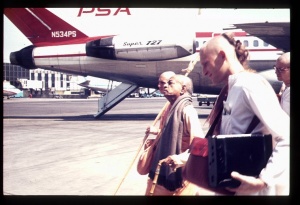SB 10.5.20

A.C. Bhaktivedanta Swami Prabhupada
TEXT 20
- vasudeva upaśrutya
- bhrātaraṁ nandam āgatam
- jñātvā datta-karaṁ rājñe
- yayau tad-avamocanam
SYNONYMS
vasudevaḥ — Vasudeva; upaśrutya — when he heard; bhrātaram — that his dear friend and brother; nandam — Nanda Mahārāja; āgatam — had come to Mathurā; jñātvā — when he learned; datta-karam — and had already paid the taxes; rājñe — unto the King; yayau — he went; tat-avamocanam — to the residential quarters of Nanda Mahārāja.
TRANSLATION
When Vasudeva heard that Nanda Mahārāja, his very dear friend and brother, had come to Mathurā and already paid the taxes to Kaṁsa, he went to Nanda Mahārāja's residence.
PURPORT
Vasudeva and Nanda Mahārāja were so intimately connected that they lived like brothers. Furthermore, it is learned from the notes of Śrīpāda Madhvācārya that Vasudeva and Nanda Mahārāja were stepbrothers. Vasudeva's father, Śūrasena, married a vaiśya girl, and from her Nanda Mahārāja was born. Later, Nanda Mahārāja himself married a vaiśya girl, Yaśodā. Therefore his family is celebrated as a vaiśya family, and Kṛṣṇa, identifying Himself as their son, took charge of vaiśya activities (kṛṣi-go-rakṣya-vāṇijyam (BG 18.44)). Balarāma represents plowing the land for agriculture and therefore always carries in His hand a plow, whereas Kṛṣṇa tends cows and therefore carries a flute in His hand. Thus the two brothers represent kṛṣi-rakṣya and go-rakṣya.